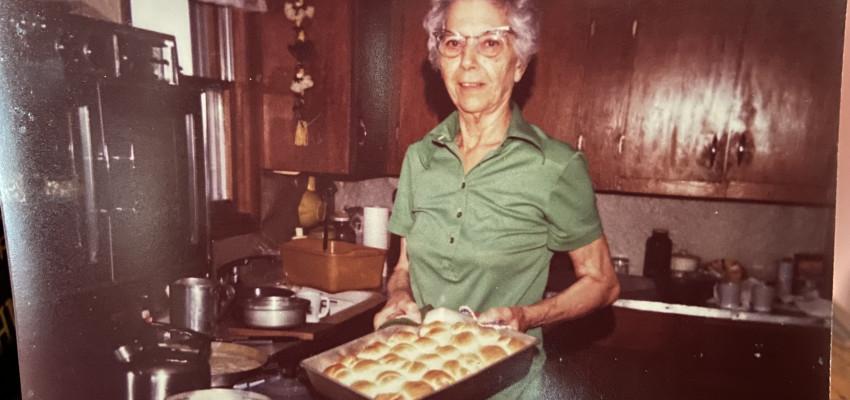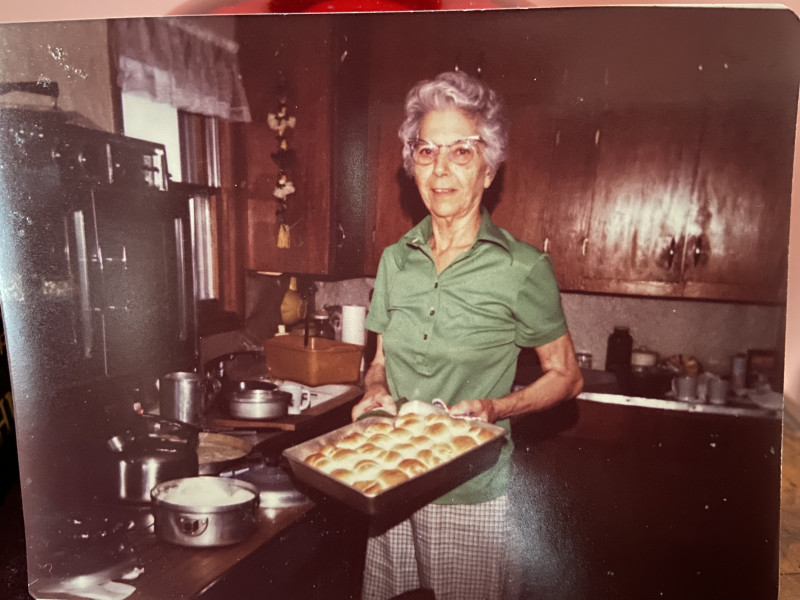By Larry Maness on October 17, 2024
Grandmother's Rolls

The only photograph I have of my grandmother shows her in her farmhouse kitchen. The harsh light from the camera’s flashbulb reflects off the dark wooden cabinet behind her left shoulder. To her right on the counter sit multiple pots. The largest pot holds a mound of mashed potatoes. In the center of the photograph, my 75-year-old grandmother, her gray hair cropped short, her metal-framed bifocals catching a streak of the camera’s flash, smiles shyly at the lens. With two hot pads, she proudly holds a freshly baked pan full of shiny, brown rolls, 28 in all. The photograph is glued to the front cover of a spiral-bound cookbook my grandmother wrote and gave to all her many grandchildren.
My grandmother baked every weekday. Saturdays were reserved for visiting family and friends; Sunday for church. Rolls, pies, cookies and cakes came out of her oven before noon when my grandfather and his hired help gathered at the manual pump in the front yard to wash with well water before entering the boot room where muddy shoes were left. I like to think it was the heavenly aroma of her baking that brought them in to eat.
Lunch was served at the round kitchen table and often featured fried chicken and gravy, potatoes and whatever vegetable was picked from the garden. Gardening was grandmother’s other job, and I often helped weed. The corn, potatoes and other vegetables came from her carefully tended rows. In the root cellar that doubled as a storm shelter protecting all from the dreaded tornadoes, grandmother kept jars of pickles, jams and preserves as well as baskets of potatoes, squash, onions and apples to winter over.
Once heads were bowed and grace was said, lunch was served in large bowls passed from one hand to another. The hot, buttery rolls were the first to disappear. A pitcher held iced tea or water. After dessert came coffee and cigarettes and more work in the fields. As a 10-year-old, I was too young to drive any machinery, so I grudgingly helped grandmother clean the lunch dishes.
I spent most summer days with either a dish towel or hoe in my hands. My father was away in the army, and my mother worked full-time. She dropped me at the farm in the morning and picked me up when her day was done. Sometimes I would spend the night at the farm in a downstairs bedroom off the kitchen.
I looked forward to spending the night, listening as grandmother shuffled about in her kitchen in the early morning. Kitchen sounds, like sounds magnified over water, are loudest in the morning. Snuggled under a warm blanket, I could hear the whirl of a mixer, metal pots clanging on top of the stove, drawers opening and closing with a bang. Grandmother’s day had begun.
I would slide out of bed and step into the kitchen where my grandfather sat drinking black coffee before and enjoying his first cigarette of what would be another hard day. A hard day for both of them.
It wasn’t until many years later when my travels took me to Rome for a few months that I began truly to appreciate how my grandmother lived. My apartment was a few steps from the famous Forno bakery at one end of the Campo di Fiori, where each morning I would hear the clatter of pushcarts rattling toward the open air market, their carts filled with flowers, fruits and vegetables.
Like my grandmother, bakers at the Forno rose early. I watched them through the bakery window mixing, shaping and baking breads, pies, pizzas and rolls. I always bought plain rolls still warm from the oven. Back at the apartment, I slathered each with butter, thankful that the simple mixture of salt, flour, yeast and water could produce such delightful tastes and wonderful memories of my grandmother holding her freshly baked pan of rolls.


